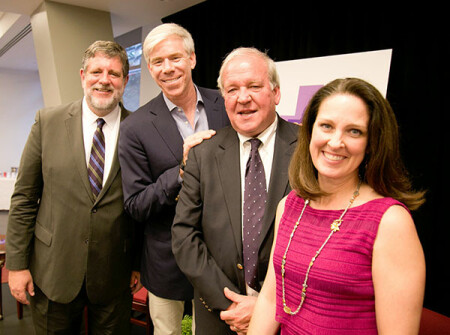Panelists explore moving faith in to the public square
By Erik Alsgaard
UMConnection Staff
Video from a lecture by Mike McCurry in the Baltimore-Washington Conference on “Why Communicating Faith in a Public Square Matters.”
How do you move faith from being something intensely personal to something open and involved in public discourse?
That was the question addressed to a panel of three experts last June at Mt. Vernon Place UMC in Washington, D.C., as it played host to “Faith in a Public Vocation: A Conversation about Politics, Media and Religion.” The forum was sponsored by the Center for Public Theology, a program of the Institute for Community Engagement (ICE) at Wesley Theological Seminary Downtown.

From left to right: the Rev. David McAllister-Wilson, David Gregory, Mike McCurry, and the Rev. Ginger Gaines-Cirelli, senior pastor at Foundry UMC in Washington, D.C. Photo by Lyndon C. Orinion.
Panelists included the Rev. Ginger Gaines-Cirelli, senior pastor at Foundry UMC in Washington; David Gregory, former host of “Meet the Press” and author of the book, “How’s Your Faith? An Unlikely Spiritual Journey;” and Mike McCurry, former White House Press Secretary under President Bill Clinton and Distinguished Professor of Public Theology at Wesley.
Guiding the conversation was the Rev. David McAllister-Wilson, president of Wesley. He began by asking Gregory about his book’s title, taken from a frequent question that President George W. Bush asked Gregory when he worked in the press corps at the White House.
Gregory said that he had grown up “culturally Jewish,” but without an authentic relationship with God. Out of that experience, he began asking questions of identity: “Who am I? What else is out there?”
It was only a personal relationship with God that would answer those questions, he said. Thus began, for him, a journey of moving his faith from his head to his heart.
The book, he said, tells the story of that journey.
McCurry, on the other hand, grew up with a strong faith but drifted away after college. It was only after he married and had children that he “wandered back in the direction of
“I floated in my faith for a while, not really having a loving relationship with God,” he said, especially while serving as Press Secretary. “Being at Kensington UMC was a safe sanctuary, a place where I could have a separated existence from others.”
“Organized religion – the church – has lost the confidence of the American people faster and more dramatically than any other institution, save Congress itself.”
– Mike McCurry
After leaving the White House, the church’s pastor invited McCurry to serve as Sunday School superintendent, a job that had gone unfilled at the church for 10 years. McCurry accepted and began teaching Middle School students.
After touching on their personal faith stories, McAllister-Wilson turned to questions of moving one’s faith into the public square.
Gaines-Cirelli, who pastors a church just blocks from the White House that often has politicians from both sides of the aisle sitting in the same pew on Sunday morning, said her job in moving faith from personal to
“What gives a person meaning?” she asked. “In Washington, D.C., that’s often answered with what you do or who you work for. At the end of the day, those are illusions.”
Gaines-Cirelli said that her role as pastor is to offer hope and promise that our world today could actually be something
“A pastor has a very public role to speak into the public square what is real,” she said.
“Many journalists find it uncomfortable to ask about faith,” said Gregory. “There’s a lot of dysfunction in reporting today. There’s a need for more humility.”
Noting that he, himself, was guilty of being self-righteous, defensive and angry in his work, Gregory said that his faith is helping him re-shape his work.
Gregory’s wife, Beth Wilkinson, attends Foundry UMC and he often goes with her.
“To walk into Pastor Ginger’s church is to find a place of renewal,” he said, “to hit ‘reset,’ to lift the spirit.”
He said he views her job, and that of his Rabbi, to elevate the conversation by bringing faith into the public square. To that end, he said, people of faith do have a voice when it comes to advocating on social issues.
“The challenge for the faith community is to elevate voices in the progressive community to compete with the conservatives,” Gregory said. “They (progressive voices) aren’t that prominent.”
McAllister-Wilson took questions from the 100 people in attendance, asked if it was “okay to use the language of faith in the public square?”
“Rather than run away, we need to engage in the public square. We have got to give our children a better model of what it looks like to be in real dialogue as we talk about the serious issues that we face in the future.”
– Mike McCurry
“Yes,” said Gregory. “It’s okay; even expected by some, but we need to be using the language of faith that is inclusive. It becomes divisive when the one speaking is sure that they have a monopoly on the truth. When that voice gets in the public square, it gets to be alienating.”
This was the first forum sponsored by the Center for Public Theology, a new program offered by Wesley in downtown Washington. McCurry said that classes for seminary students and others will begin in the fall to help address the brokenness in politics and to help shape seminary students for the world they will face after graduation.
“We’ll be doing more events like the one tonight,” he said, “where we model more civil dialogue around political issues in Washington. We will have offerings of curriculum and offerings in the community, including our non-degree Certificate in Faith and Public Life.”
